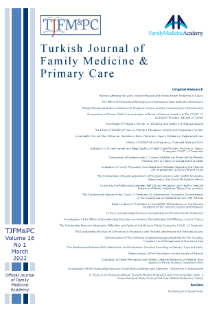Hasta-Hekim İlişkisine Kavramsal Yaklaşım
Hasta-hekim ilişkisi, Yol gösterme-işbirliği etme, Paternalistik model
A Conceptual Approach to Patient-Physician Relationship
___
- 1) Ataç A. İletişim, tıp etiği ve tıp uygulamalarında yansıması. Hacettepe Tıp Dergisi 2009;40:89-95.
- 2) Foucault M. Hermenötiğin Kökeni: Kendilik Hakkında-Dartmouth Konferansları 1980. Çiltaş Solmaz Ş, çev.editörü. L'origine de L'herméneutique de soi. İstanbul: Ayrıntı Yayınları; 2017.p.19-20.
- 3) Szasz TS, Hollender MH. A contribution to the philosophy of medicine; the basic models of the doctor-patient relationship. AMA Arch Intern Med 1956;97(5):585-592.
- 4) Habiba MA. Examining consent within the patient-doctor relationship. J Med Ethics 2000;26(3):183-187.
- 5) Öngören B. Hekim-hasta ilişkisi ve sağlık hizmetlerinde iletişim 2. Tıbbi Sosyal Hizmet Dergisi 2017;(10),57-69.
- 6) Epstein RM. The patient-physician relationship. In: Mengel MB, Holleman WL, Fields SA, editors. Fundamentals of Clinical Practice. Boston:Springer; 2002. p.403-429.
- 7) Oğuz NY. Klinik uygulamada hekim-hasta ilişkisi. Tıbbi Etik 1995;3(2-3):59-65.
- 8) Vertinsky IB, Thompson WA, Uyeno D. Measuring consumer desire for participation in clinical decision making. Health Serv Res 1974;9(2):121-134.
- 9) Atıcı E. Hasta-hekim ilişkisi kavramı. Uludağ Üniversitesi Tıp Fakültesi Dergisi 2007;33(1):45-50.
- 10) Coulter A. Paternalism or partnership? Patients have grown up-and there's no going back. BMJ 1999;319(7212):719-720.
- 11) Tuckett D, Boulton M, Olson C, Williams A. Review of Meetings between experts: an approach to sharing ideas in medical consultations. Family Systems Medicine 1987;5(2),264-266.
- 12) Emanuel EJ, Emanuel LL. Four models of the physician-patient relationship. JAMA 1992;267(16):2221-6.
- 13) Lazaro J. Doctors’ status: changes in the past millenium. Lancet 2000;354:17.
- 14) Savulescu J. Rational non-interventional paternalism: why doctors ought to make judgements of what is best for their patients. J Med Ethics 1995;21(6):327-33.
- 15) Örs Y. Geçmişte ve günümüzde hekim-hasta ilişkisi. Tıp Dünyası 1975;48(6):224-30.
- 16) Siegler M. The progression of medicine. Arch Internal Medicine 1985;145:713-715.
- 17) Wells RE, Kaptchuk TJ. To tell the truth, the whole truth, may do patients harm: the problem of the nocebo effect for informed consent. Am J Bioeth 202;12:22-29.
- 18) Salmon P. Conflict, collusion or collaboration in consultations about medically unexplained symptoms: the need for a curriculum of medical explanation. Patient Education and Counseling 2007;67:246-54.
- 19) Balint M. The doctor, his patient, and the illness. Lancet 1955;1:683-8.
- 20) Pendleton D, Schofield T, Tate P, Havelock P. The consultation: an approach to learning and teaching. London: Oxford University Press; 1984. p:34-38.
- 21) Epstein RM, Street RL Jr. The values and value of patient-centered care. Ann Fam Med 2011;9(2):100-103.
- 22) Entwistle VA, Cribb A, Watt IS, Skea ZC, Owens J, Morgan HM, et al. "The more you know, the more you realise it is really challenging to do": tensions and uncertainties in person-centred support for people with long-term conditions. Patient Educ Couns 2018;101(8):1460-1467.
- 23) Carvallo A. Physicians and professionalism. patients and information. Rev Med Chil 2005;133(2):253-258.
- 24) Borza LR, Gavrilovici C, Stockman R. Ethical models of physician-patient relationship revisited with regard to patient autonomy, values and patient education. Rev Med Chir Soc Med Nat Iasi 2015;119(2):496-501.
- ISSN: 1307-2048
- Yayın Aralığı: Yılda 4 Sayı
- Başlangıç: 2007
- Yayıncı: -
COVID-19 GİBİ SALGINLARDA EVDE BAKIM HİZMETLERİNİN ÖNEMİ: KISA BİR BAKIŞ
Endemik guatrın dünü, bugünü ve yarını
Gebelerde algılanan psikolojik eziyet düzeyi ve etkileyen faktörler
Covid-19 Gibi Salgınlarda Evde Bakım Hizmetlerinin Önemi: Kısa Bir Bakış
Gebelerde algılanan psikolojik eziyet düzeyinin belirlenmesi
Karabük İlinde Kadınların Kontraseptif Yöntem Tercihleri ve İlişkili Faktörler
Semra EROĞLU, Vusale AZİZ, Fatma KILIÇ
Using Mobile Applications in Cancer Scanning and Evaluating the Effectiveness
Başak Aslı ÇANKAYA, Funda YILDIRIM BAŞ, Arda ÇANKAYA
Obezite ile Mücadelede Obezite Merkezleri; Antalya İli Örneği
Aile Hekimliği Polikliniğine Başvuran 40 Yaş Üzeri Hastalarda Glokom Farkındalığı ve Sıklığı
Murat ÇAKMAKLİOĞULLARİ, Didem ADAHAN, Fehmi ALİBEKİROĞLU, Nurullah USLU
Kanser Taramasında Mobil Uygulamaların Kullanılması ve Etkinliğinin Değerlendirilmesi
